How important is the environment in terms of success or failure?
There is a lovely analogy that says if crops fail to grow, the farmer does not punish the crops but looks at the field, the weather, the preparation, and the nutrition that went into the soil. The farmer examines what circumstances have transpired to undermine the crop’s flourishing. This analogy clearly shows that the right environment can be critical to whether we flourish or not.
There’s also the opposing argument that we should not be subject to the environment, with our moods changing like flags in the breeze. Instead, we should transcend the slings and arrows of misfortune, having more confidence and self-reliance to strive, persevere, and accomplish regardless.
The former model is about the relationship with nature and circumstances, whereas the latter is more ego-driven, emphasizing mankind’s dominion over nature and success as a triumph over circumstances rather than collaborative compromise. It’s about working with nature, with other people, and with the circumstances that arise to achieve something.
It’s not that one model is right and the other wrong, although some people will have their preferences. Personally, as someone deeply involved in water sports, I see myself somewhere in between. I recognize the influence of the tide, the current, and the breeze. I also recognize the agency of my own effort, whether I am sailing, rowing, or paddling. I take account of these things. I don’t ignore them or row directly against the tide. Instead, I see what can be accomplished given the circumstances and try to work with nature, to surf the boat or seek a competitive advantage from the ever-changing and complex situation.
This approach comes from a combination of strong self-belief, determination, focus, and attitude. Yet, I am incredibly thoughtful, reflective, and curious about the prevailing conditions and how I should prepare, take counsel, or take advantage of them.
As a high-performance coach, I can’t control the weather or the circumstances that may befall my athletes. However, I can help them prepare, giving them the experience, expertise, skills, and confidence to master themselves and manage the situation. I believe strongly in creating an environment where success is inevitable. I’m not a fan of relying on individual talent, luck, or superheroes. Building a solid base of experience, facing adversity, and overcoming hardship not only builds mental toughness and resilience but also teaches valuable lessons. It helps us recognize when to fight and push on and when to yield and navigate.
This is particularly true in long-distance events like Ironman triathlons or long-distance coastal rowing. Reducing effort when pushing against the tide or climbing a hill prevents overspending our energy and becoming overdrawn when a new opportunity arises, such as surfing down waves or racing down a hill. This is tactical: managing ourselves, managing the situation, knowing our limits, and not overreaching.
I particularly like this metaphor because it fits the endurance-based sports I do. Life, like these sports, is not a 100-meter sprint but about the long haul. It’s about making compromises, building relationships, and being flexible to circumstances. It’s not always about getting your way but recognizing other factors, negotiating, accommodating, and adjusting tactics without giving up.
A personal example is when I broke my arm five weeks before the Commonwealth Games.
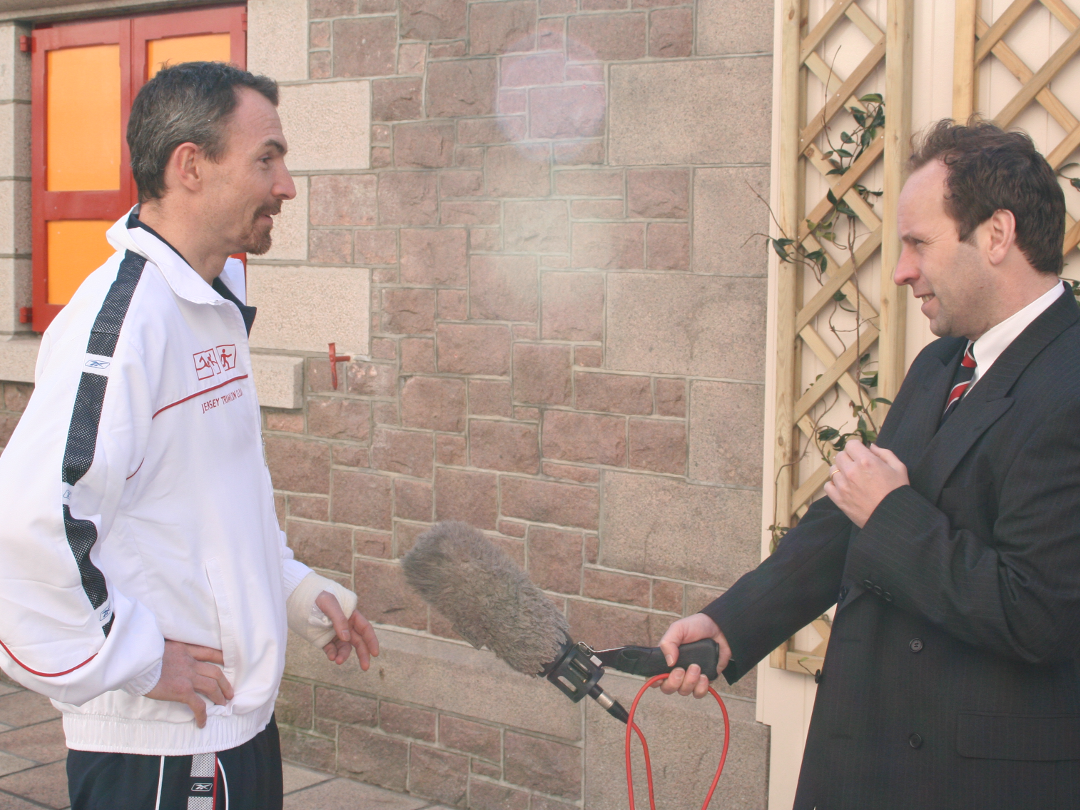
Being interviewed on TV. I kept the narrative positive and focused on going to the games
I had to accept the situation and figure out what I could still do. With a broken arm, I could still run, and once it was in a cast, I could ride a time trial bike, albeit with difficulty navigating corners.
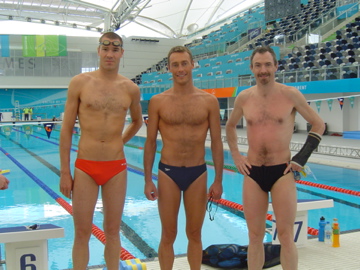
Whilst the others had been acclimatizing for months, I flew in from February snow and got sun-burned!
By replacing the cast with a Kevlar one wrapped in plastic, I could even swim. Although this incident compromised my chances for a gold medal, maintaining focus on what I could do allowed me to gain the necessary support from the race referee, team manager, and race medic.
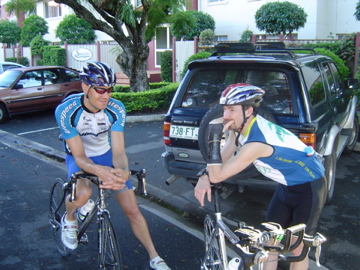
Where there is a will there is a way, and it doesn’t have to be hard!
Ironically, not overtraining in the last five weeks probably did me more good than harm, and I managed to place 19th in the Commonwealth Games.
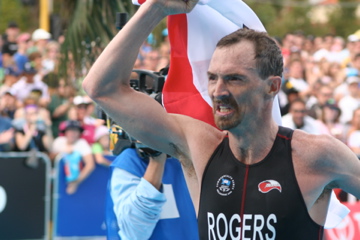
Sometimes life is about achieving what we can given our situation
This is not a story of winning or losing in style, but doing the best you can with the circumstances you have. We can’t all be winners by definition, so sometimes life is about achieving what we can given our situation. It’s not just about mental toughness or relentless pursuit of a goal but also intelligent thinking. What can I do? How can I do it? Who can help me? What compromises can be made? In my case, the breakthrough was replacing the Kevlar cast, which risked injuring other athletes in the swim, with carpet tape. Wrapped in carpet tape, I was able to swim, bike, and run. Much of my success was due to the people who came up with such ideas and believed in me enough to suggest them, and my willingness to try them.
Life and Goal Lessons
Endurance Over Speed: Life, like endurance sports, is about the long haul, making compromises, building relationships, and being flexible to circumstances.
Environment’s Role in Success: The right environment is crucial for flourishing, much like a farmer who adjusts the field conditions to ensure crops grow successfully.
Self-Reliance vs. Environment: While the environment matters, personal resilience and self-reliance are also essential for success, transcending misfortune through confidence and perseverance.
Balance of Nature and Effort: Success often requires a balance between working with nature and applying personal effort, understanding when to cooperate with external circumstances.
Preparation Over Control: As a coach, one cannot control external factors but can prepare individuals to handle situations confidently and skillfully.
Building Resilience: Facing adversity and hardship builds mental toughness, resilience, and teaches valuable lessons about when to push forward and when to adapt.
Strategic Energy Management: In long-distance events, managing effort strategically prevents burnout and leverages opportunities when conditions improve.
Positive Focus Amidst Adversity: Maintaining a positive narrative and focusing on achievable actions despite setbacks can lead to unexpected successes.
Adapt and Innovate: When faced with limitations, find creative solutions and adapt. For instance, using a Kevlar cast wrapped in plastic allowed for continued participation despite a broken arm.
Thoughtful Adaptation: Combining self-belief, determination, and reflective thinking helps in adapting to prevailing conditions and taking advantage of them.
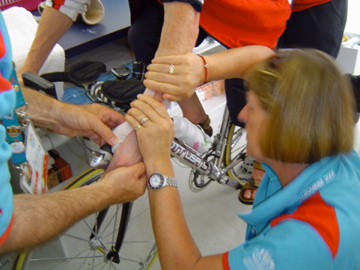
Prior to settling on carpet tape, we [a full medical team of curious people] tried all sorts of innovations
Support System: Success often involves collaboration and support from others. Gaining the support of race officials and teammates can make a significant difference.
Managing Expectations: Recognize and accept the reality of the situation. Adjust goals and strategies to fit current circumstances while still striving for the best possible outcome.
Focus on What Can Be Done: Instead of dwelling on limitations, focus on what actions can still be taken. This mindset can lead to achieving unexpected results.
Intelligent Compromise: Success isn’t just about relentless pursuit but also about making smart compromises and strategic adjustments.
Appreciating the Journey: Sometimes, success is about making the best out of a situation rather than achieving a predefined goal. It’s about the journey and how we navigate it.
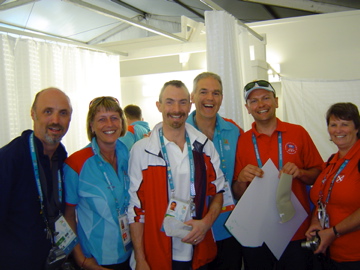
Do not ever underestimate the number of stakeholders involved in your success
Mental Flexibility: Being flexible and open to new ideas or methods can turn potential setbacks into opportunities for success.
Endurance and Persistence: Life and long-distance sports both require enduring effort and persistent focus, adjusting tactics as needed without giving up.
Strategic Focus: Knowing when to conserve energy and when to push hard is crucial in both sports and life, ensuring that efforts are not wasted.
Innovation Under Pressure: High-pressure situations can lead to innovative solutions, emphasizing the importance of creative problem-solving.
These lessons collectively highlight the importance of balancing environmental factors with personal effort, adaptability, strategic thinking, and the support of others in achieving success.
